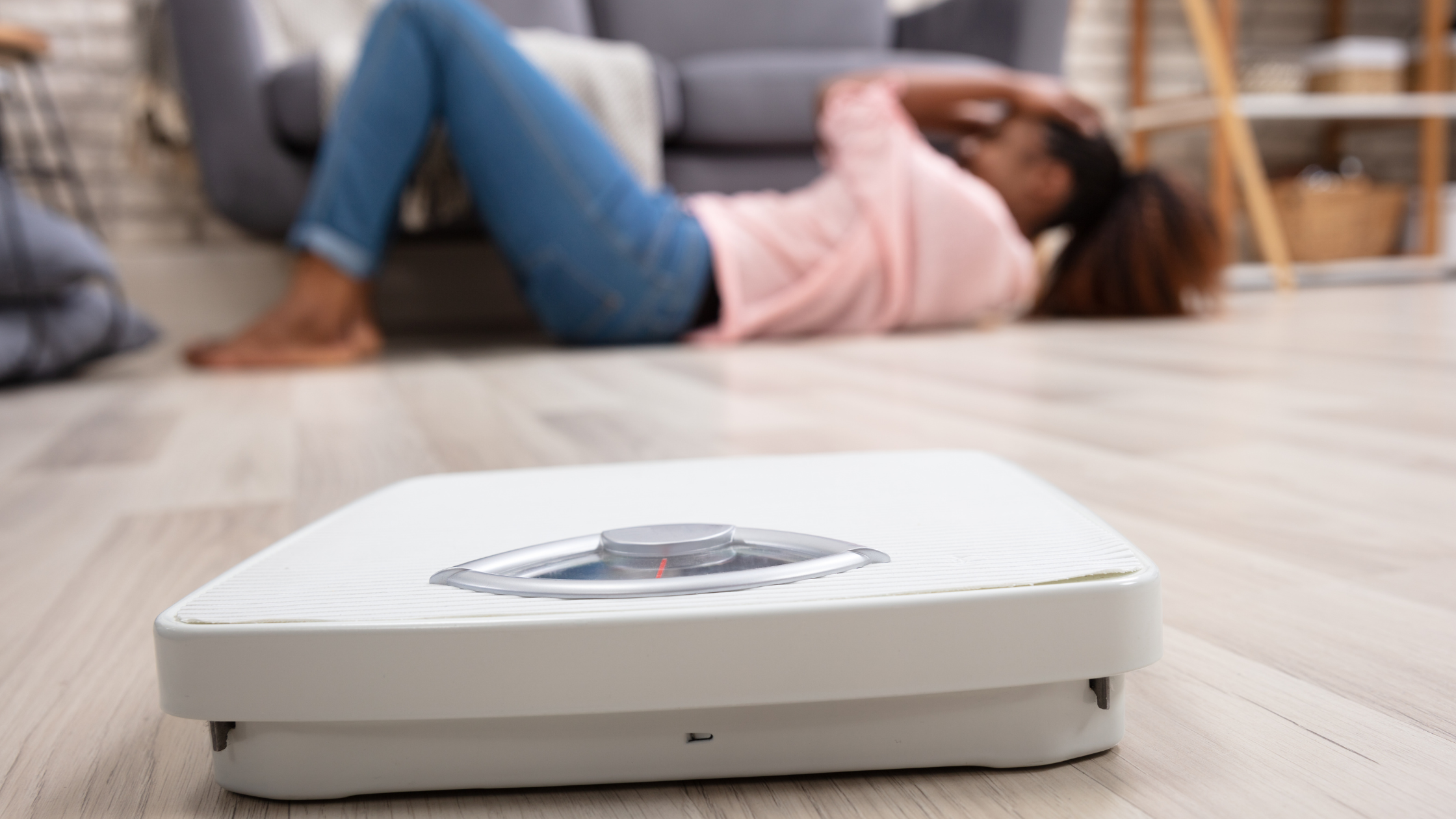What is the Set Point Weight Theory?
Is there a set point weight that our body wants to be at? How do we find out what this set point weight is? Can our set point weight change?
If you have even dabbled in intuitive eating and Health at Every Size, you likely have heard the term “set point weight”. Put simply, your body has a set point weight (it’s actually more of a weight range - more on that later) that it prefers to be at. This is where your weight will settle when you stop dieting and overexercising and trust your body’s cues to tell you when, what, and how much to eat rather than relying on food rules.
I know, it might sound scary to just trust your body to weigh whatever it wants to! Especially if you have been trying really hard to control the number on the scale. Giving up this control may also feel scary because we live in a culture that hyper focuses on the idea that we can and should control our weight at all times. But according to the set point weight theory, this control isn’t really possible.
If you’re new here, hello and welcome! My name is Hannah and I am a non-diet dietitian here to help you improve your relationship with your food and finally find food freedom.
In this blog we will cover:
What is the set point weight theory?
Can set point weight change?
What does the set point weight theory have to do with intuitive eating?
How do you know if you are at your set point weight?
How can you get to your set point weight?
What is the set point weight theory?
The set point weight theory describes that our bodies have a set point weight that they are programmed to be at and no matter how hard we try to change our weight (through dieting, for example), the set point weight theory states that our biology is going to fight us to settle around that weight. Any time we gain weight or lose weight, our body will compensate to get us to a set point weight range. This largely explains why dieting often results in weight gain rather than weight loss.
Can set point weight change?
Short answer - yes. Your set point weight will likely change over various seasons of life. Despite what diet culture says, most people don’t weigh the same their entire adult life.
I have worked with so many women in their 30s, 40s, and 50s (and even above) that have had a goal of being at their “high school weight”. Of course, this rarely is achieved because their bodies have changed with age. And this is not a bad thing! Bodies are meant to change. Menopause, pregnancies, and health conditions such as PCOS and Hashimoto’s can all result in weight changes.
The set point weight theory also states that your set weight is actually a range. It is normal for your weight to fluctuate by about 10-15 pounds (sometimes more, sometimes less). Your weight will vary from day to day and week to week.
If you have been dieting and restricting, this range may be much larger. You may have experienced this before - you lose weight while dieting, but then as you stop following the diet, the weight rapidly comes back on as your body fights for homeostasis. Then, to regain a sense of control, you go back on another diet and the cycle continues.
These drastic fluctuations are known as weight cycling and it is one of many reasons why dieting is harmful and unhealthy. In fact, some experts state that weight cycling is worse for your health than maintaining a weight that is considered “overweight” (heavy quotation marks there because the term “overweight” assumes that there is a correct weight to be at, which is untrue).
As you stop trying to change your body size and control your eating habits, you will likely find that your weight will remain fairly consistent.
What does the set point weight theory have to do with intuitive eating?
One central piece of intuitive eating is putting less control over what you eat and learning to listen to your body. Your body is smart and will tell you what it needs to be healthy. A diet plan does not know what your body needs. Intuitive eating helps you to allow your body to settle within its set point weight range while also properly fueling your body with the nutrients it needs.
As you start to listen to and trust your body, you might experience weight changes, especially if you have been a chronic dieter for a long time. As you work towards intuitive eating, you might gain weight, lose weight, or remain the same weight. Many ex-dieters experience a combination of all three as they are building back trust with their body.
Intuitive eating and Health at Every Size (HAES) also emphasize a concept called weight neutrality. Weight neutrality is a mindset shift away from the focus on your weight and perceiving your body as either “good” or “bad” based on its size. Body and weight neutrality emphasize nurturing and caring for your body regardless of how you feel about it, because you won’t always love your body 24/7 and that’s okay!
How do you know if you are at your set point weight?
At this point you might be asking yourself “okay, but how do I find my set point weight range?” or “how long will it take to get to my set point weight?” I am going to answer your question(s) with a question - why do you want to know what your set point weight is? Is it because you feel uncomfortable at your current weight? Perhaps you are hoping to lose weight with intuitive eating? Are you are worried about gaining weight?
If you answered yes to any of those questions, that is okay. It is normal to feel this way considering how weight gain and residing in a larger body is so frowned upon in our society.
The set point weight theory can be very helpful to explain why intentional weight loss diets don’t work, but getting caught up in what your set point weight is can, in itself, be a diet-like mentality that we want to break free from. When you try to control your body size, even to get to your “set” weight, this can lead to feelings of deprivation that will likely cause your body to go into the restrict-binge cycle.
If you are actively trying to stay at your “set point weight”, just like you would a “goal weight” while dieting, you are missing the point. There is no objective way to know what your set point weight is. And that’s okay! Worrying about being above or below your set point weight is going to keep you in the diet cycle. The set point weight theory can be helpful for us to better understand the false sense of control that we have over the number on the scale. Because the truth is, it is impossible to know what weight you “should” be. Not to mention that your set point weight may be “overweight” or “obese” based on BMI. Which is more than fine because BMI is garbage.
That said, there are some signs that you may not be at your set point weight (hint: they all have to do with being in a diet mindset).
Signs you likely are not at your set point weight
You are always bouncing between diets to "get healthy".
Your period has stopped or is very irregular.
You go through periods of restriction and periods of excess.
You feel that you are always thinking about food.
You find yourself over exercising to "burn off" food you have eaten.
How can you get to your set point weight?
In order for your body to settle within its set point weight range, you need to stop dieting and quit overexercising. You have to give up control (again, I know this can feel scary). Your weight is not a behavior, meaning that you cannot “do” weight loss. Rather, allow your weight to settle at its best weight as a result of you ditching the diets and making peace with food. This will be so much more sustainable than setting intentional weight loss goals.
Intuitive eating is a great way to achieve a weight that feels comfortable and sustainable. This is because intuitive eating removes weight from the focus and instead allows you to focus on how you feel. By learning to listen to your body, you will be providing it with the nutrition and movement (along with rest) that it needs.
Your weight may fluctuate at first as you incorporate previously off-limits foods and navigate your natural hunger and fullness cues. You may gain weight, especially if you were previously eating less than what your body needed. You may lose weight if you dieting lead to binge eating or in any other way eating past your body’s needs. But remember, weight loss cannot be the goal of intuitive eating and it is not the outcome that every new intuitive eater ends up with.
You do not need to jump off the deep end and transition into intuitive eating all at once. Take small steps and remember to give yourself grace. You can’t do intuitive eating “wrong” - it is a journey of learning opportunities and self-discovery.
Bottom line
The set point weight theory can help you to make peace with food and your body by removing need for control over your body size. It is important to not let your set point weight be a new version of “goal weight”, but rather just the outcome of you feeding your body what it wants and needs and incorporating gentle and joyful movement.
Looking for more support on your journey of weight-neutral health? We’d love to guide you inside The Nutrition Reboot Membership.
Learn more
Featured podcast episode
Want more help on your intuitive eating journey?
Join my membership to become part of a community of ex-dieters working towards food freedom and making peace with food so they no longer need to cut out their favorite foods.

































